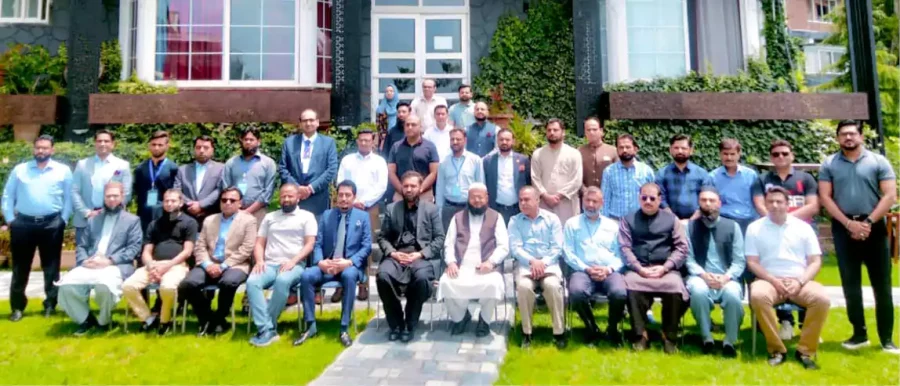Participants at a group photo on ‘Islamic Finance Summer School’ at Natyagali, Abbatabad.
Ijaz Kakakhel Islamabad
Speakers at a seminar termed ‘interest’ is killing of economy and stressed for adopting Islamic Banking which is in consonance with the spirit, ethos and value system of Islam governed by the principles laid down by Islamic Shariah.
These views expressed during three days long seminar on ‘Islamic Finance Summer School’ at Natyagali, Abbatabad. They said Islamic banking refers to Shariah compliant banking which does not contain any element repugnant to Shariah ruling and it is in line with Shariah guidelines.
Speaking on the occasion, Dr Mufti Muhammad ZubairUsmani, Chairman Shariah Board HBL said that not only Muslim but non-Muslim countries also adopted Islamic Banking because they are thinking that there was huge potential in Islamic Banking.
The rules and regulations of Islamic Banking are according to Quran and Sunnah. The journey of Islamic Banking was begin 1980’s and still there are some cases in court over Islamic banking.
The Chairman Shariah Board HBL further said there was a need for digital and financial technology innovations. Mufti Usmani further said one of the biggest problem for banking system that large number of big businessmen, traders could not use banking channels and prefer over cash transaction. It is due to wrong policies of taxation of the government.
He also said that one of the most significant problems confronting Islamic Banking (IB) is the lack of awareness among Muslim and non-Muslim individuals regarding the products and services offered by the IB and the various modes of Islamic financing.
To foster a better understanding of the concept of Islamic banking and financial institutions among the public, it is crucial to organize intensive public education campaigns. IB faces several other significant challenges: lack of determination at senior executives and managers, Lack of clear rules and adequate supervision, misconceptions between IB and conventional banking (CB), customers, and rival banks’ criticism of IB products and services. To compete effectively with other financial institutions, IB needs to focus on product innovation and develop a broader range of offerings that fulfil the needs of individuals and businesses.

Chairman and Editor-in Chief Pakistan Observer is receiving memento from Professor Dr Shafiullah Jan, Program Director CEIF IMSciences at Natyagali, Abbatabad.
These products must comply with Shariah principles and align with the specific legislative requirements, guidelines, and circulars of the country they operate in.
Another scholar on the subject, UsmanIhsan from Bank Al Falah said that being a Muslim country, all banks in Pakistan should be Islamic but unfortunately the government adopted conventional banking. The decision of Federal Shariah Court and Supreme Court judgement about Islamic Banking should be kept above. He said interest is prohibited in Quran and we should get rid of it.
Highlighting the role of media in promotion of IB, Chairman and Editor-in-Chief Pakistan Observer Faisal Zahid Malik said Islamic Banking has gained special significance due to the Federal Shariah Court’s verdict prohibiting Riba in all forms per Islamic injunctions, with a grace period for implementation until December 2027.
While the outcome of the appeal by the State Bank of Pakistan and other banks is pending, it is commendable that the government has vowed not to challenge the verdict, paving the way for the promotion of Islamic banking in Pakistan. Transforming the entire economy to be Riba-free in five years is a significant challenge, but the steps taken by the SBP and the successful implementation of Islamic banking by various banks provide a strong foundation for achieving this goal.
The Chairman and Editor-in-Chief further said that Pakistan has a clear advantage in promoting Islamic banking. There are approximately 520 banks and 1,700 mutual funds around the world that comply with Islamic principles. Islamic banking has a marked presence in over 100 countries and has seen a consistent growth rate of 10-13% year-on-year since the early 2000s.
Due to a growing asset base, the market share of Islamic banking rose by Rs 577 billion during October-December 2023, reaching Rs 8,994 billion by the end of the quarter. Similarly, deposits of Islamic Banking Industry (IBI) increased by Rs 589 billion to reach Rs 6,749 billion.
The year-on-year growth of assets and deposits of IBIs was 24.4 percent and 30.8 percent, respectively.
Due to some how awareness, more people prefer Shariah-compliant financing and banking. It is now up to banks and financial institutions to tap this huge potential for their own benefit and that of the national economy.
Faisal Zahid Malik thanks the management of Centre for Excellence in Islamic Finance (CEIF), Institute of Management Sciences (IMSciences) Peshawar, who arragned the gathering to discuss Islamic Banking. He also stressed the need for proper coverage of Islamic Banking, its products, problems and a way forward for further growth.
“We have been devoting special attention to the cause of Islamic banking in Pakistan, especially because it has the potential to help resolve economic woes of the country due to its vast potential.”
Other speakers also adress the gathering which are; Professor DrUsmanGhani Director IMSciences, Prof DrShafiullah Jan Program Director CEIF IMSciences, UmerIqbal Sheikh Group Head Taqwa Islamic Banking the Bank of Punjab, Qazi Abdul Samad RSBM the Bank of Khyber, DrKarimullah Master Trainer and Founding Head CEIF IMSciences, DrShahzadZeb learning and development consultant and others.










